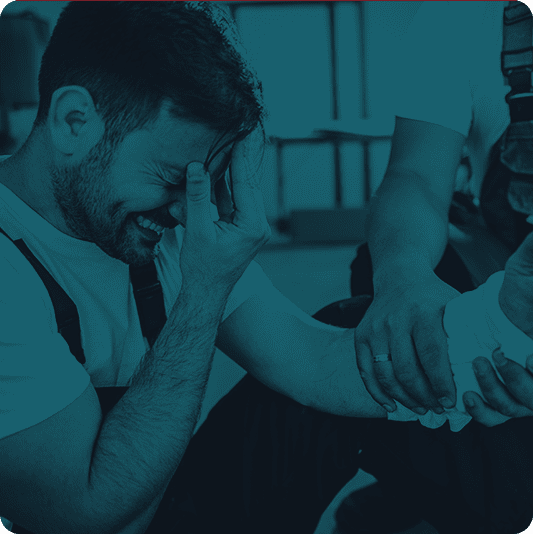Nursing home abuse is a real issue that’s common in our societies. In fact, research shows that residents at assisted living facilities are at a higher risk of physical abuse, neglect, sexual abuse, and medical malpractice. This is compared to other senior people who don’t live in nursing homes. So when a loved one has suffered from nursing home abuse in Tampa, it’s likely that you have certain questions. In cases related to Tampa nursing home abuse, some common questions are:
Our nursing home abuse lawyers can help you by answering these questions. Not only that, but we also specialize in holding care institutions accountable in cases of Tampa Nursing Home Abuse or Neglect. We have some of the most experienced nursing home abuse lawyers in Tampa. Our firm believes in holding unethical institutions accountable for compensation when they cause distress, injury, or even wrongful death. This will motivate them to improve their services and offer better care. You can contact our Tampa nursing home abuse attorneys for a free consultation.
Denmon Pearlman An Experienced Law Firm
When you hire an attorney to take your Tampa nursing home abuse and neglect case, you require someone with not just expertise, but empathy to understand what you’re going through. But how do you know that you’ve hired the right nursing home abuse attorney? An excellent place to start is by asking the following questions.
Is My Attorney An Expert In Handling Nursing Home Abuse Cases?
Your preferred attorney should be proficient in Florida nursing home law. But at the same time, they should have enough experience when it comes to handling multiple cases. The lawyers at Denmon | Pearlman have years’ worth of combined experience handling personal injury cases. This includes cases pertaining to Tampa nursing home abuse, elder abuse, wrongful death, sexual abuse, and even medical malpractice. Our knowledge about various practice areas can make a big difference when we need to investigate, negotiate, and settle a client’s case. More importantly, it will help when you decide to go to trial in the Tampa Bay area.
Can Independent Sources Verify Their Expertise And Ability?
It’s common for a personal injury attorney to claim they know what they’re doing. This is especially since they use persuasive and attractive marketing tactics. However, a high rating on independent directories is an objective way to assess your attorney’s capability. It also determines the likelihood of your family getting compensation after experiencing nursing home abuse.
The success of any legal matter depends on the unique circumstances of each case, therefore, we cannot guarantee particular results for future clients.
Are They Willing To Take Your Case To Trial?
Before you proceed, you should understand that not all cases of Tampa nursing home abuse go to trial. Most cases opt to settle. Nonetheless, if your Tampa nursing home abuse case has to go to trial, you need to hire an attorney that’s willing to do so. Hence, your preferred attorney should possess enough experience, ability, and resources to take your case to trial.
What Does Nursing Home Abuse Mean?
We’ll get into the details of nursing home abuse laws in Florida. But first, it’s essential to understand what nursing home abuse is. According to Florida Statute 415.102(1), nursing home abuse is ‘a willful act committed by a caregiver, which results in impairment to a vulnerable adult’s emotional or physical well-being. Abuse can include acts, and even omissions, such as neglect. In Florida, some staff members at Tampa nursing homes abuse elderly residents. This can be indifferent, and even subtle ways.
For instance, the management abuses nursing home residents by deliberately understaffing facilities. This is a tactic used to increase profits. Nursing home abuse also includes cases of staff physically and verbally mistreating residents. These are very common, but there are also other examples of nursing home abuse, such as:
What Is Neglect In Nursing Homes?
In Florida statute 415.102(16), nursing home neglect is defined as the omission or failure of the caregiver to provide necessary services and supervision required to preserve the mental and physical well-being of a vulnerable adult.
Nursing home neglect includes, but isn’t limited to, medicine, clothing, food, supervision, shelter, and medical services. As you can see, it includes things that a sensible person would regard necessary for a vulnerable adult’s health. But what’s the reason behind the most prevalent forms of neglect in Tampa nursing homes or assisted living facilities? Usually, it occurs when the staff and management become desensitized to the difficulties faced by elders. It gets so a point that they lose empathy and the ability to care.
When it comes to neglect, there are some common examples observed in nursing homes. Physical forms of neglect include:
Forms of medical neglect are:
Can You Sue An Assisted Care Living Facility For Negligence?
Most certainly; you can take legal proceedings against an assisted care living facility for negligence. Your family and elderly loved ones are entitled to compensation. Such incidents have become common in Tampa nursing homes. Nevertheless, you still need to gather enough evidence. An experienced Tampa nursing home abuse attorney can help you with this. This way, you can hold the nursing home accountable.
Hiring a Tampa nursing home abuse lawyer won’t change what has happened to a resident. Nonetheless, a lawsuit can prevent such incidents from happening in the future by holding assisted living facilities accountable. If you think that a loved one or elderly relative is suffering from abuse at the hands of nursing home staff, look for signs that confirm your suspicions.
Don’t hesitate to give us a call if you think that a loved one has suffered from neglect at a Tampa nursing home and you need help identifying certain signs. We can guide you through the legal process and its terms.
The Causes of Tampa Nursing Home Abuse and Neglect
The issue of nursing home abuse in Tampa doesn’t imply that all of them are unsafe. Many provide proper healthcare to residents. But some have a goal of making profits rather than looking after residents. In such cases, they compromise on resident healthcare to make a profit on purpose.
They make a willful decision of putting money before residents health. For them, the only cost of running a nursing home is to pay employees. As a result, they hire limited staff on purpose to reduce the expense of paying their nursing home staff.
Reducing the Number of Employees on a Shift
Nursing homes reduce the cost of paying employees in two main ways. One is to willfully hire fewer employees than required to meet residents’ needs. Or they may reduce the number of working employees on each shift. This is so that the employees on duty don’t have enough time to look after every resident.
Usually, residents who have the most needs get the least care. Meanwhile, those who need additional assistance fail to get it. When there’s limited staff, even basic needs fail to be met. Basic needs include supervising residents who may fall, providing water and food to those who can’t look after themselves, and cleaning up after them if they’re incontinent. In the case of bed-bound residents, it’s important to reposition them.
Negligence can result in injury, falls, fractures, pressure sores, and even unnecessary death.
Hiring Under-Qualified People
Secondly, nursing homes reduce the cost of staff by hiring under-qualified people for less money. Often, these employees are highly under-qualified. So, they vent out their frustration on elderly patients when they don’t know how to handle them.
Different Forms of Neglect and Abuse in Nursing Homes
Regardless of what type of nursing home abuse type that occurs. Often, it ends with a vulnerable resident suffering from injury and/or death. The most common forms observed are:
Identifying Signs of Nursing Home Neglect and Abuse
It’s not easy to identify when an elder is being abused or neglected. It requires an observer to be carefully vigilant. But in the end, it eventually pays off when you help remove the resident from a dangerous situation. Look out for the following signs:
Dehydration Neglect in Tampa Nursing Homes
Commonly, nursing home residents aren’t able to stay properly hydrated by themselves. There can be multiple reasons for this. The most common is that their medical condition causes them to use up water faster. It can also be that their kidneys don’t function properly or they may forget to drink water. Sometimes, they simply need help with drinking fluids.
Neglect: The Main Reason for Dehydration in Tampa Nursing Homes
It’s common for seniors to suffer from dehydration due to health issues. But in Tampa assisted care living facilities and nursing homes, neglect is a primary reason for dehydration in residents. In understaffed nursing homes, workers are often overwhelmed by how much they need to handle. So much, that they don’t have the time to check if each resident has had enough fluids.
What Are The Signs Of Dehydration?
Elderly residents who are dehydrated will display the following symptoms:
If you notice an elderly relative showing such signs, report them to the administration in charge of the Tampa nursing home.
Tampa Nursing Home Wandering and Elopement Neglect
Residents suffering from conditions like dementia or Alzheimer’s may often roam around the facility aimlessly. Wandering behavior puts them at risk of serious injury or even death if the nursing home fails to look after them.
There are two main concerns:
- Wandering, which is when a resident roams while inside the facility;
- Elopement. This is when a resident requiring supervision manages to leave the facility without being noticed.
Residents who wander through hallways are at a higher risk of falling accidents. Meanwhile, nursing home residents who elope from the facility may get lost. In the worst-case scenario, they may suffer from injury and/or death because of an auto accident, starvation, dehydration, or bad weather.
Are Negligent Tampa Nursing Homes Responsible For Injury or Death Due To Wandering or Elopement?
You’re probably wondering; what if a certain Tampa nursing home refuses to take responsibility for a resident who wanders and suffers from an injury due to an auto accident? Fortunately, it isn’t that simple for nursing homes to avoid responsibility.
Does the facility choose to look after residents with conditions such as dementia or Alzheimer’s? If yes, they’re well aware that such patients can elope or wander.
Also, negligence isn’t the result of under-compensation. In fact, the resident’s family pays the nursing home very well for supervision. Facilities are most likely negligent in the following scenarios:
At Denmon | Pearlman, our lawyers can investigate your case and gather evidence. Contact us for a consultation if a loved one has suffered from an injury due to wandering or elopement from a negligent nursing home. Our expert legal consultants will explain the terms and complexities of the process.
Choking Due To Nursing Home Negligence
Many residents living in nursing homes have trouble swallowing due to poor health. This is medically known as Dysphasia. It needs the resident to be looked after constantly. Otherwise, they can choke on food, liquids, or even their medication. Some of the worst instances of choking lead to a reduced supply of oxygen to the brain. This results in brain damage, and perhaps even death.
Nursing Home Resident Falls and Accidents
Many residents in nursing homes live there because they need help when moving from place to place. Because of their condition, they don’t have the strength to walk on their own. Such residents rely on full-time caregivers to help them move around. This can be through a wheelchair, walker, or just being repositioned while bed-bound.
Responsible nursing homes have safety practices in place. These are to help residents with mobility issues while preventing slipping and falling accidents. When such rules aren’t followed, residents can suffer from severe injury.
If a resident suffers from a fall accident due to a lack of supervision, the family can hire a personal injury lawyer to determine if the accident was preventable. If it was, an expert attorney can make the concerned nursing home take responsibility and pay compensation.
Victims of Combativeness at Nursing Homes
It’s common for nursing homes to house patients suffering from either dementia or Alzheimer’s. As these patients lose their memory, it’s common for them to become aggressive. This is one of the main reasons families put their elderly loved ones in a nursing home. They can’t deal with the problem on their own and want to seek help from professionals.
Tampa nursing homes market their services to these very families. They claim that they have the right experience, skills, and training to handle such behavior, called combativeness. Examples of combativeness in nursing home residents include kicking, throwing things, punching, and pushing. Sometimes, staff also observes hitting, scratching, biting, cursing, and screaming.
The Need to Prevent Injury from Combative Residents at Nursing Homes
Nursing homes make a lot of money caring for residents with combative behavioral issues. But when a nursing home resident suffers from an injury due to a combative resident’s aggressive behavior, the facility may try to claim that the accident was unavoidable. But this isn’t true. Nursing homes or assisted living facilities can take several safety measures. They can prevent combative nursing home residents from harming others, and even themselves.
What If A Combative Nursing Home Resident Injures A Loved One?
At the Denmon | Pearlman law firm, our attorneys have can determine if the injury to a client’s loved one was the result of nursing home abuse or negligence. Call us now for a free consultation. We start by thoroughly reviewing a nursing home abuse case’s terms and facts. After that, we help the family take legal action against the facility.
Are There Any Safe Nursing Homes In Tampa?
There are approximately 21 nursing homes in Tampa, Florida. Altogether, they can look after over 2,500 residents.
An elder’s family must evaluate a facility before enrolling their loved one. This is the best way to prevent cases of nursing home abuse. Here are some of the things you need to look out for:
What You Should Do If a Loved One Has Suffered From Nursing Home Abuse
Start by removing your loved one from the dangerous situation because otherwise, you may risk further distress. After that, you should consider hiring a Tampa nursing home abuse attorney. Taking legal action against the care facility is critical in preventing further accidents or nursing home abuse.
The personal injury attorneys practicing at Denmon | Pearlman law firm can hold them accountable. We can assist your family in making sure that no other residents suffer from such neglect or abuse.
Our Expertise
We have your back. Whatever you might be suffering from, accidents, injuries or medical malpractice, we have you covered throughout Florida
Let’s get in touch!
The initial consultation is absolutely FREE
Denmon Pearlman
Law
St. Petersburg Office
520 2nd Ave South
St. Petersburg, FL 33701
(727) 800-4601
Denmon Pearlman
Law
New Port Richey Office
5703 Main Street
New Port Richey, FL 34652
(727) 478-0518
Denmon Pearlman
Law
Brooksville Office
1790 E Jefferson St.
Brooksville, FL 34601
(352) 309-7354
Denmon Pearlman
Law
Seminole Office
5290 Seminole Blvd. Suite D
St. Petersburg, FL 33708




